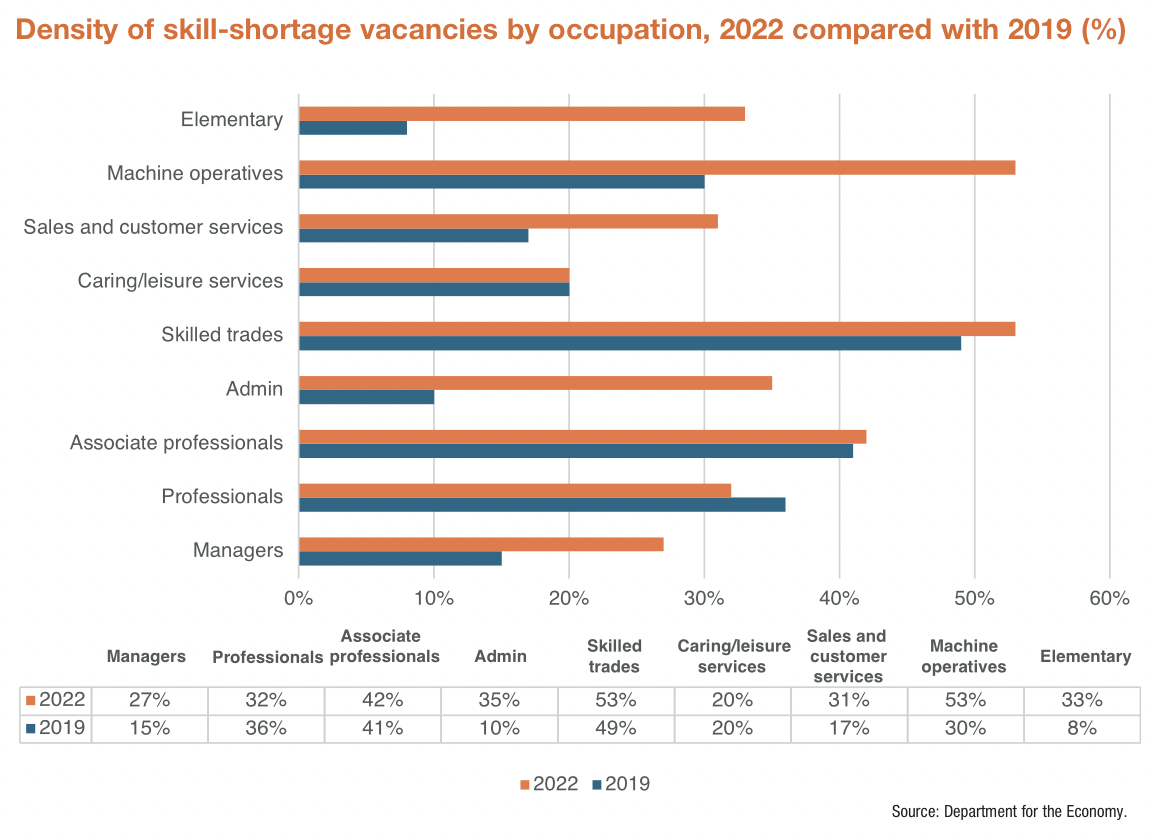Skills-shortage vacancies double between 2019 and 2022

The Employer Skills Survey 2022 indicates that skills-shortage vacancies have more than doubled since 2019, with one-in-10 establishments experiencing at least one such vacancy.
Published in December 2023, the survey reveals significant challenges faced by employers in Northern Ireland regarding skills shortages, internal skills gaps, and underutilisation of staff.
The survey highlights a notable increase in skills shortage vacancies (SSVs). According to the data, 20 per cent of establishments had at least one vacancy at the time of the survey, with a total of 39,500 vacancies reported. Of these, 13,700 were identified as SSVs, more than doubling since 2019. This surge in SSVs reflects a significant challenge for employers, impacting their ability to find candidates with the necessary skills, knowledge, or experience.
Skill-shortage vacancies varied by region and sector, with the highest rates in transport and storage (60 per cent), construction (56 per cent), and the primary sector and utilities (52 per cent). In contrast, SSVs were less prevalent in health and social work (14 per cent) and public administration (17 per cent). The prevalence of SSVs also increase with establishment size, ranging from 5 per cent among establishments with between two and four employees to 47 per cent among those with 250 or more employees.
Skills gaps and underutilisation
In addition to SSVs, the survey reveals a significant presence of skills gaps among individuals within the workforce. Approximately 11 per cent of employees (36,700 individuals) in Northern Ireland were identified as having skills gaps in 2022. Skill gaps exist when an employer thinks a worker does not have enough skills to perform their job with proficiency. This increase from 26,300 in 2019 (3.3 per cent) reflects growing challenges in retaining and developing a skilled workforce. Causes of skills gaps include factors such as new hires requiring training, staff lacking motivation, and inadequate training provision.
Moreover, the survey finds a high rate of underutilisation of skills, with 37 per cent of Northern Ireland employers reporting having staff with qualifications and skills exceeding their job requirements. This underutilisation is most common in the health and social work (48 per cent) and arts and other services (46 per cent) sectors, indicating a mismatch between employee skills and job requirements.

Impacts of skill-shortage vacancies and skills gaps
The presence of SSVs and individual skills gaps has a tangible impact on business performance. Nearly all establishments with SSVs (96 per cent) reported adverse effects, such as increased workloads for other staff (90 per cent), difficulties in meeting customer service goals (62 per cent), and increased operating costs (59 per cent). These impacts underscore the importance of addressing skill shortages to ensure an organisation’s efficiency, productivity, and economic competitiveness.
Additionally, skills gaps affected performance in several ways, with 68 per cent of employers noting a negative impact. Challenges included decreased productivity, quality issues, and a strain on existing staff. This highlights the need for effective training and workforce development strategies to bridge these gaps and improve overall business outcomes.
Training, apprenticeships, and HPW practices
Examining employer training practices, the survey reveals that Northern Ireland organisations are less likely to provide continuous training compared to those in Scotland, England, and Wales. However, nearly two-thirds of employers expect to need to upskill their workforce in the next 12 months, indicating a growing recognition of the importance of ongoing training and development.
Apprenticeships also play a role in addressing skill shortages, with one-in-seven employers in Northern Ireland offering formal apprenticeships in 2022. The manufacturing sector is most likely to offer apprenticeships (32 per cent), followed by education (27 per cent), and hospitality (20 per cent). Notably, nearly one-third of employers indicate plans to offer apprenticeships in the future, suggesting a positive outlook for workforce development.
High-performance working (HPW) practices, designed to nurture and harness employee skills, were adopted by 6 per cent of employers, with the most common practices being equal opportunity policies (83 per cent) and on- or off-the-job training (60 per cent).
Evolving economic landscape
The significant increase in SSVs since 2019 underscores the need for employers to invest in training, apprenticeships, and HPW practices to bridge skills gaps and improve business performance. Addressing these challenges is crucial for ensuring a skilled and proficient workforce, promoting business growth, and maintaining competitiveness in a rapidly evolving economic landscape.





